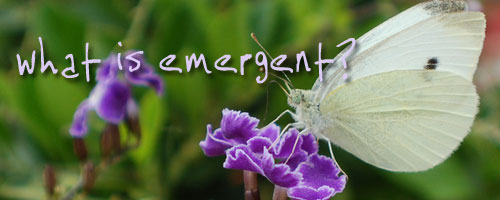
Last week Peter Rollins wrote (in the spirit of the Apostle Paul)::
You are all children of God through faith in Christ Jesus, for all of you who were baptized into Christ have clothed yourselves with Christ. There is neither high church nor low church, Fox nor CNN, citizen not alien, capitalist nor communist, gay nor straight, beautiful nor ugly, East nor West, theist nor atheist, Israel nor Palestine, hawk nor dove, American nor Iraqi, married nor divorced, uptown nor downtown, terrorist nor freedom fighter, paedophile nor loving parent, priest nor prophet, fame nor obscurity, Christian nor non-Christian, for all are made one in Christ Jesus. (ht: Existentialpunk)
Today, Thomas shared thoughts on Unity vs Uniformity in our tribes and communities of faith.
I believe wholeheartedly in the “ones” in this passage (Eph 4:1-16):
- one body
- one Spirit
- one hope
- one Lord
- one faith
- one baptism
- one God and Father of all… who is over all and through all and in all.
This is unity… but this doesn’t demand uniformity. The very passage speaks of having different giftings… we are gifted with different things so that we can make a stronger WHOLE than the SUM OF OUR PARTS.
We are all different. We all have different experiences… different baggage… different tastes and preferences and worldviews. This diversity makes the collective whole stronger.
He continued, saying that our communities of faith should not be melting pots where everything is thrown out and the end result is goop, but instead we should be salads — where everything is put together to add value and unique flavor and nutrition.
A carrot by itself is OK but add it with spinach or lettuce and tomatoes and you get a tasty salad. Throw in a few nuts (like most of our communities of faith have :-)) and you have WOW! All the flavors blend together as one.
Perhaps this is why Jesus prayed for the generations of Christ followers that would come after him ::
I’m praying not only for them
But also for those who will believe in me
Because of them and their witness about me.
The goal is for all of them to become one heart and mind—
Just as you, Father, are in me and I in you,
So they might be one heart and mind with us.
Then the world might believe that you, in fact, sent me.
The same glory you gave me, I gave them,
So they’ll be as unified and together as we are—
I in them and you in me.
Then they’ll be mature in this oneness,
And give the godless world evidence
That you’ve sent me and loved them
In the same way you’ve loved me. – John 17:20-23
I hope that in all my communities of faith I offer spaces of grace. Where the labels are shed at the door and a space is created where everyone is equal, regardless of where they are in their walk, regardless of what bounded set they find themselves in, regardless how far they are from the center point as long as we’re all helping draw one another to the True Center Point.
Like this:
Like Loading...

